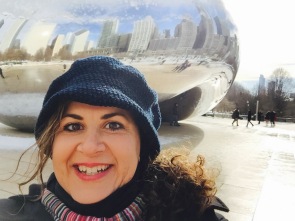I love Chicago. There is something that draws me to that city, improv aside, it calls to me like a siren and I am easily wooed. Last year when I visited, it was the dead of winter. I always think it is somewhat miraculous when you can be in warm beautiful weather and bitter freezing cold in the same 24-hour period. The one environment makes you forget the
 other exists.
other exists.
For this visit, I was on a mission. I wanted to see countless hours of improv. I wanted to be moved, to be inspired, and to remember why I fell in love with theater in the first place.
My first visit to Chicago was probably 15 years ago. I remember dragging my
older sister through the streets of the city from one humble venue to another until the wee hours of the morning. My sister, a non-performer and mother of 2 or 3 kids at the time-(I honestly can’t recall), was a willing companion. At the time, we visited each space. There were no frills. The performers lit up the tiny stages. I remember being packed into a crowded IO Theater and being so close to the performers, I could touch them. On another trip, when I begged my brother to come along, we visited The Annoyance Theater. It was a simple room with plain folding chairs and an old piano on the side of the audience. The players were the shiniest thing in the room. They breathed life into these ordinary spaces.
The words of a college professor echoed in my mind, “Theater is created with a space, a performer, and an audience.”
Seeing those small spaces and raw performances, it was clear these artists redefined the boundaries between stage and audience, and without all the bells and whistles-they made art. No excuses. It was small and simple.
When I first started doing improv, I read everything I could get my hands on and fast learned that behind the scenes, these small movements had starters firing the gun to initiate creativity-an improv maker.
In much of the U.S. I’d argue that some of the most innovative improv happens in small obscure spaces such as these and whatever visionary is “behind the curtains,”-people pay little to no attention to them, but they are there.
So when I returned a year ago, I was struck by the explosion of improv. All of these humble beginnings have turned into beautiful facilities with multiple classrooms and theaters in each space. I had to push through people to get in. Being there, I almost forgot there was something small years ago. The one environment made me forget the other ever existed.
But it did. Small things grow into bigger things. There was a visionary, seen or unseen- and now I was witnessing the fruit of their work. I couldn’t help but be encouraged. There is something special in the small, a kind of intimacy, that prepares for the bigger. The self-effacing visionaries in the work of improvisation understand this.
When I heard about Jason Chin, passing away, I read an article that said he would sweep and mop the IO stage floor before shows. I was struck by that. Chin, a greatly loved improv giant, made the stage ready for creative genius. He swept the remnants of the previous night’s improv shows and yesterday’s classes-to ready it for something bigger. He was an improv maker…making a way for the small to transform into the big and for me to witness yet another performance so I can be reminded why I love improv.
“If you are faithful in little things, you will be faithful in large ones…” Luke 16:10


 What do we do when an emergency happens? We improvise.
What do we do when an emergency happens? We improvise.